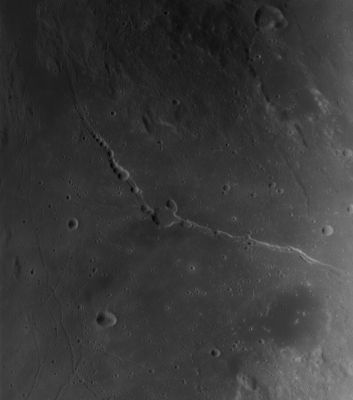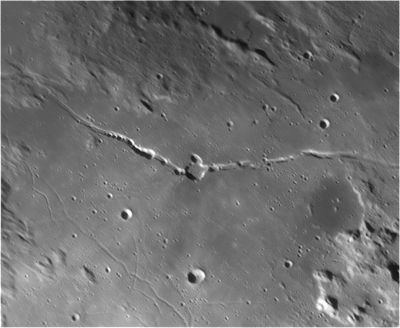Rima Hyginus
Contents
Rima Hyginus
|
Lat: 7.4°N, Long: 7.8°E, Length: 219 km, Depth: km, Rükl: 34 | |
Right: Wes Higgins The IAU's Rima Hyginus is the long channel passing through Hyginus, the irregularly-shaped crater in the center of the field.
Images
LPOD Photo Gallery Lunar Orbiter Images Apollo Images
- An oblique northward view of Rima Hyginus, with Manilius in the background, was made by Lunar Orbiter 3 (Frame 3073).- DannyCaes Mar 23, 2008
- Three extraordinary close-ups of Rima Hyginus, made by Lunar Orbiter 5, are: Frames 095, 096, and 097.- DannyCaes Mar 23, 2008
- One of LO-5's three impressive close-ups of Rima Hyginus was included on page 236 in the NATIONAL GEOGRAPHIC of February 1969 (AWESOME VIEWS OF THE FORBIDDING MOONSCAPE; a nine-page portfolio).- DannyCaes Mar 23, 2008
Maps
(LAC zone 59C2) LAC map Geologic map AIC map
USGS Geologic Map of the Rima Hyginus region (I-945)
Description
One of the most attractive telescopic objects on the entire nearside of the moon! - DannyCaes Feb 16, 2014
Description: Elger
(IAU Directions) HYGINUS ... is remarkable for the great cleft which traverses it, discovered by Schroter in 1788. The coarser parts of this object are easily visible in small telescopes, and may be glimpsed under suitable conditions with a 2 inch achromatic. Commencing a little E. of a small crater N. of Agrippa, it crosses, as a very delicate object, a plain abounding in low ridges and shallow valleys, and runs nearly parallel to the western extension of the Ariadaeus rill. As it approaches Hyginus it becomes gradually coarser, and exhibits many expansions and contractions, the former in many cases evidently representing craters. When the phase is favourable, it can be followed across the floor of Hyginus, and I have frequently seen the banks with which it appears to be bounded (at any rate within the formation), standing out as fine bright parallel lines amid the shadow. On reaching the W. wall, it turns somewhat more to the N., becomes still coarser and more irregular in breadth, and ultimately expands into a wide valley on the N.W. It is connected with the Ariadaeus cleft by a branch which leaves the latter at an acute angle on the plain W. of Silberschlag, and joins it about midway between its origin N. of Agrippa and Hyginus. It is also probably joined to the Triesnecker system by one or more branches W. of Hyginus.
Description: Wikipedia
Additional Information
There's a small compact chain of five to six depressions between the offset northwestern extension of Rima Hyginus and the bowl-shaped crater Hyginus D north of it.
An interesting test object for observers with common to large backyard telescopes!
Nomenclature
- The rille is named after the nearby crater, Hyginus.
- Mary Blagg's Collated List of 1913 included three rilles associated with Hyginus: catalog entry 876 (the principal rille through Hyginus -- known as Hyginus Alpha to her authorities), #877 (to the east and known as Hyginus Zeta to Neison), and #878 (to the northwest and known to Neison as Hyginus Eta).
- The original IAU nomenclature of Blagg and Müller (1935) retained #876 as the Hyginus Cleft and #877 as Hyginus Ir.
- Hyginus Cleft seems to have been Latinized to Rima Hyginus in the System of Lunar Craters, where #877 (connecting Rima Hyginus to Rima Ariadaeus) became Rima Hyginus I. Apparently, no Roman numeral designation was assigned to the former Hyginus Cleft to distinguish it from Rima Hyginus I.
- Although there were formerly at least two rilles involved, this feature was listed in the singular ("rima" rather than "rimae") in the IAU Planetary Gazetteer, so it is unclear if the System of Lunar Craters Rima Hyginus I' is still regarded as part of the system, or not. - JimMosher
LPOD Articles
Say Hi to Hyginus Troughful Magnificence Colorful Interpretation Numbering the Marvels
Lunar 100
L24: Rille containing rimless collapse pits.
Bibliography
Wood, C.A. 9/1/2006. Moons Mystery Rilles. S&T 112(3):54-55

